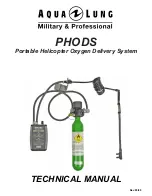
ALL-TEST
PRO
®
31 User Manual
©2011, ALL-TEST
Pro,
LLC
www.alltestpro.com
rev 2011-11F
6
II.
Safety
CAUTION:
The AT31 is designed to test
de-energized equipment
safely and quickly.
Improper application of the AT31 on live circuits is a danger to the user and will result in
the destruction of the testing circuit, requiring instrument replacement.
Instrument Warnings and Considerations
The ALL-TEST
PRO®
31 is a CE registered instrument.
The following is a list of considerations for equipment life and accurate data collection:
Ensure that all power has been removed from the circuit being tested, including static power
stored in capacitors – Discharge all capacitors being tested.
Attaching the AT31 to live voltage will destroy the unit and void the warranty.
Do not attempt to change the batteries. Contact your distributor of the AT31, ALL-TEST
Pro.
LLC
at 860-399-4222 or via email, [email protected], to have the battery pack replaced.
Do not open the instrument. Electrostatic charges may damage surface mount electronics. Please
contact your vendor or ALL-TEST
Pro
authorized repair center.
Use only the supplied charger for charging the instrument. It is an integral part of the charging
circuit. Using the wrong charger will damage your instrument.
General Safety Considerations
Following are general safety considerations for using the AT31 motor tester:
The AT31 is an off-line motor tester. All power and residual power must be disconnected. It
provides a safe method of testing your electric motors.
Follow all safety rules of your company and OSHA (or country equivalent) for off-line testing
methods, including appropriate Personal Protective Equipment (PPE).
Improper or unsafe operation of
the equipment is the sole responsibility of the user.
For MCA testing, the AT31 sends out a low voltage, high frequency signal not harmful to the
technician or most electronic equipment (variable frequency drives and soft starts). However, electronic
equipment and personnel must observe appropriate safety considerations (disconnect electronic
equipment) when performing the insulation to Ground resistance test (Meg-Ohm) test.







































